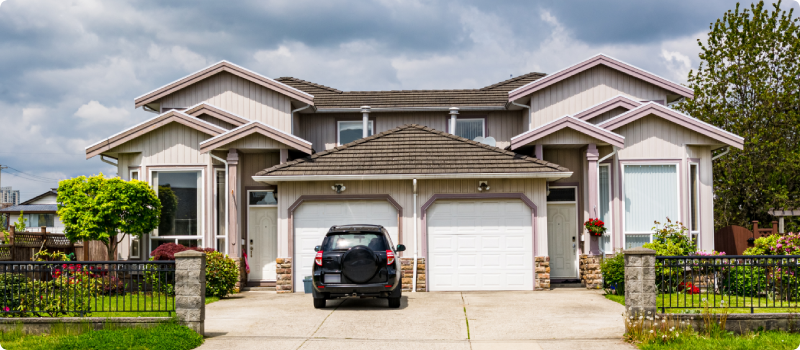Buying a Duplex as Your First Home
Updated April 24, 2024 . AmFam Team
Searching for your first home is one of the most exciting pursuits of your life. You’ve got financial freedom and you’re ready to use it to get a place all your own! And while you might be eager to ditch the shared walls of an apartment complex, don’t rule out the shared walls of a duplex. There are plenty of reasons why it could be the right choice for you. Let’s take a look.
Financial Benefits of Buying a Duplex
One of the biggest reasons most people consider buying a duplex when they’re searching for their first home is the investment opportunity. Check out why it’s a good financial move to invest and live in a duplex.
Renting Your Duplex Could Help You During the Loan Process
When you plan on renting out one side of a duplex, you may be able to factor that into your income and qualify for a larger home loan. Talk to your mortgage officer for specific details.
Your Tenants Help Pay Your Mortgage
When you’re living in one side of the duplex and renting out the other, you’re taking a big chunk out of your mortgage payment every month. When you compare your reduced mortgage payment to what you’d be paying if you purchased a single-family home, duplex living seems like a no-brainer.
You May Be Able to Write Off Some Expenses on Your Taxes
Talk to your tax professional for more specific advice, but since your duplex is producing income, it’s technically a business — and that means you’ll have some opportunities for tax benefits that you wouldn’t have if you’d picked a single-family home.
Things to Consider Before Buying a Duplex
If the income portion of owning and renting a duplex sounds good to you — great! But don’t let that drive your entire decision. There are plenty of other work, social and risk factors to consider before you jump into the rental game. Check them out:
Handling an Empty Unit
If the other side of your duplex doesn’t have a renter, you need to be prepared to advertise, show the unit, maintain it and handle months of no rent payments. Make sure you’re able to devote as much time as necessary to keep the unit in good shape and get it occupied.
Sharing Walls
If you had your heart set on privacy that your old apartment couldn’t offer, you might not love the fact that your unit will share at least one wall with your neighbors. Be prepared for the occasional noises, especially if your tenant likes to entertain.
Respecting Shared Property
You’ll probably be sharing a driveway, a lawn or other parts of your property with your tenants. Making sure that you’re both respecting the shared property and cleaning up after yourselves is an important part of creating a healthy tenant/landlord relationship.

Preparing to Become a Landlord
Unfortunately, buying and renting out a duplex isn’t a “set it and forget it” kind of investment. Before you ever show the unit to a prospective renter or hold an open house, you’ll need to brush up on some landlord basics. Here are some tips for learning to become a duplex landlord:
Research Rent Prices in Your Area
Setting a fair rental price is a major key to getting renters and keeping your other unit occupied. Look for similar units and compare and contrast the features, prices and location to yours.
Learn the Local Rental and Landlord Laws
Depending on the location of your duplex, you’ll have different rules and regulations to abide by. Your tenant’s rights will depend on your location, too. These laws will cover things like security deposits, what you’re required to disclose about the unit to potential renters and more.
Prepare for Repairs
If you don’t fancy yourself a handyperson, ask around and search online for a reputable maintenance person in the area. You’ll be doing yourself and your tenants a favor by making sure you’ve got someone trustworthy to handle the unexpected maintenance issues that come with renting.
Don’t Expect Regular, On-Time Payments
It’s a tough pill to swallow, but as a landlord, you won’t always be paid promptly by your tenants. That’s why you should work to build a strong rapport with whomever is living on the other side of the duplex. Give your tenants the respect and honesty you’d expect to get, and you’ll be better off — both financially and personally — in the long run.
Protect Your New Duplex with Insurance
If you decide that buying a duplex is the right choice for your first home, reach out to your insurance agent to learn about your coverage options.
You'll want to make sure that you have landlord insurance that protects you from surprises that come from the job as well as a homeowners insurance policy that protects your home and property.
This article is for informational purposes only and based on information that is widely available. We do not make any guarantees or promise any results based on this information. This information does not, and is not intended to, constitute legal or financial advice. You should contact a professional for advice specific to your situation.

